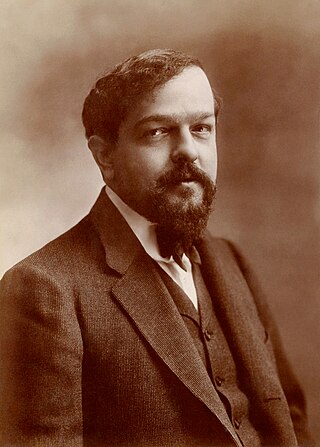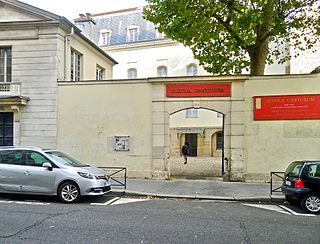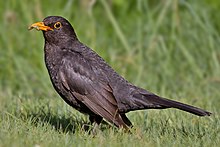
(Achille) Claude Debussy was a French composer. He is sometimes seen as the first Impressionist composer, although he vigorously rejected the term. He was among the most influential composers of the late 19th and early 20th centuries.

Olivier Eugène Prosper Charles Messiaen was a French composer, organist, and ornithologist. One of the major composers of the 20th century, he was also an outstanding teacher of composition and musical analysis.

Yvonne Louise Georgette Loriod-Messiaen was a French pianist, teacher, and composer, and the second wife of composer Olivier Messiaen. Her sister was the Ondes Martenot player Jeanne Loriod.

The Conservatoire de Paris, also known as the Paris Conservatory, is a college of music and dance founded in 1795. Officially known as the Conservatoire National Supérieur de Musique et de Danse de Paris (CNSMDP), it is situated in the avenue Jean Jaurès in the 19th arrondissement of Paris, France. The Conservatoire offers instruction in music and dance, drawing on the traditions of the 'French School'.

Gérard Henri Grisey was a twentieth-century French composer of contemporary classical music. His work is often associated with the Spectralist Movement in music, of which he was a major pioneer.

The Schola Cantorum de Paris is a private conservatory in Paris. It was founded in 1894 by Charles Bordes, Alexandre Guilmant and Vincent d'Indy as a counterbalance to the Paris Conservatoire's emphasis on opera.

Henri Benjamin Rabaud was a French conductor, composer and pedagogue, who held important posts in the French musical establishment and upheld mainly conservative trends in French music in the first half of the twentieth century.

Louise-Justine Messiaen, more commonly known under her pseudonym Claire Delbos, was a French violinist and composer, and first wife of the composer Olivier Messiaen.
Messe de la Pentecôte is an organ mass composed by Olivier Messiaen in 1949–50. According to the composer, it is based on twenty years of improvising at Église de la Sainte-Trinité, where Messiaen was organist since 1931.

Des canyons aux étoiles... is a large twelve-movement orchestral work by the French composer Olivier Messiaen. American Alice Tully commissioned the piece in 1971 to celebrate the bicentenary of the United States Declaration of Independence in 1976.

La Nativité du Seigneur, neuf méditations pour orgue is a work for organ, written by the French composer Olivier Messiaen in 1935 in Grenoble.
Trois Petites Liturgies de la Présence Divine is a cantata by Olivier Messiaen for women's voices, piano solo, onde Martenot, percussion battery, and small string orchestra, in three movements. Its libretto was written by Messiaen himself, who composed the work from 1943 to 1944.
Georges Paul Alphonse Emilien Caussade was a French composer, music theorist, and music educator.

Elsa Jacqueline Barraine was a composer of French music in the time after the neoclassicist movement of Les Six, Ravel, and Stravinsky. Despite being considered “one of the outstanding French composers of the mid-20th century,” Barraine's music is seldom performed today. She won the Prix de Rome in 1929 for La vierge guerrière, a sacred trilogy named for Joan of Arc, and was the fourth woman ever to receive that prestigious award.

O sacrum convivium! is a short offertory motet for four-part mixed chorus by French composer Olivier Messiaen, setting "O sacrum convivium". It was composed and published in 1937.

The Verset pour la fête de la Dédicace is a short composition for organ by French composer Olivier Messiaen. It was completed in 1960.

The Prélude, usually affixed with the subtitle pour orgue, is an organ piece in E major by French composer Olivier Messiaen. The work, which dates from the 1920s, is, along with the Offrande au Saint Sacrement, the earliest surviving organ work of the composer. Scholars differ as to the exact date and purpose as to when and why it was composed.

Diptyque : essai sur la vie terrestre et l'éternité bienheureuse is a piece for organ by French composer Olivier Messiaen.
Réveil des oiseaux is a work by Olivier Messiaen for piano and orchestra written in 1953. Messiaen invoked birdsong in this composition, as he had in the earlier Quatuor pour la fin du temps (1941). In Réveil des oiseaux he used bird song motifs throughout.













